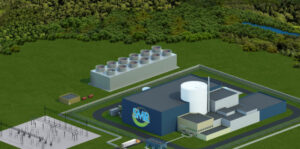
Nuclear power plants seen starting operations by 2032
THE GOVERNMENT expects nuclear power to start feeding into the grid by 2032 at the earliest, the Department of Energy (DoE) told a House committee on Wednesday.
DoE Director for Energy Policy and Planning Michael O. Sinocruz said the Philippine Energy Plan contemplates the creation of eight small modular reactor units, each capable of producing 150 megawatts (MW), with consolidated energy output of at least 1,200 MW in the next decade.
The DoE also envisions additional conventional units capable of producing 1,200 MW by 2035, with further units expected to produce 2,400 MW by 2050.
“Renewable energy will dominate the capacity mix (with) as much as 71%,” Mr. Sinocruz told the Committee on Nuclear Energy. “Nuclear will be providing at least 10% of this capacity by 2050.”
The projection assumes the Philippines hits “the set target for renewable energies (of) 50% by 2040 onwards.”
The National Economic and Development Authority (NEDA) told the panel that the inclusion of nuclear energy is in line with the expectations of the agency by 2040.
Ambisyon Natin 2040 is a development plan conceptualized by NEDA that sees the Philippines as a “prosperous middle-class society where no one is poor,” according to the NEDA website.
However, Ambisyon Natin 2040 is just “an aspiration; it’s what we want to see in the state of the country in 2040,” NEDA Director Francis Bryan C. Coballes said.
In its current six-year planning horizon, NEDA sees the need to integrate reliable power infrastructure to support growth. These infrastructure items include the “inclusion of nuclear energy.”
“The role of infrastructure is to support other economic sectors,” Mr. Coballes said. “It’s supposed to be the foundation to support economic activities which will eventually help us achieve our goal.”
NEDA sees the benefits of adopting nuclear energy in the power mix as it is “clean and carbon-free” and a source of “reliable baseload power.” — Kenneth Christiane L. Basilio



